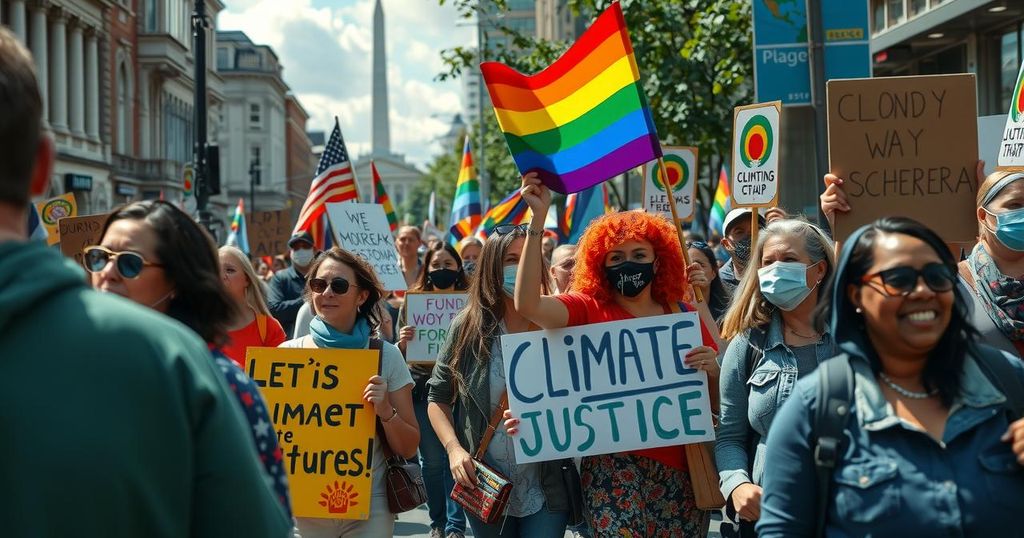Senegalese Women Demand Climate Justice in Dakar March Ahead of COP29

On Saturday, Senegalese women marched in Dakar calling for climate justice, urging polluting countries to reduce greenhouse gas emissions ahead of COP29. They demanded compensation for climate impacts as Senegal faces increased flooding, affecting thousands and damaging crops. Activists emphasized the need for accountability from nations responsible for climate change, which disproportionately affects Africa despite its low contribution to global emissions.
Senegalese women actively sought climate justice in Dakar on Saturday, demanding immediate action from what they termed “polluting countries” to reduce greenhouse gas emissions, in anticipation of the 2024 UN Climate Change Conference (COP29) scheduled for November 11. Approximately 50 women climate activists took to the streets, echoing sentiments that have been a part of an annual march since 2021 but are deemed particularly urgent this year. As they marched through the Medina neighborhood, participants shouted slogans such as “Down with capitalism! Down with polluting countries!” while holding banners that called for the protection of Senegal’s natural resources and a transition towards a decarbonized future. Cheikh Niange Faye, a former tour guide from Senegal’s Thiès region, expressed frustration, stating, “It’s been four years that we’ve been marching, and nothing’s changed. They’re spending billions to do their conferences, but they owe us billions in compensation,” highlighting the disparity between the actions of industrialized nations and the plight of vulnerable populations in rural areas, particularly as flooding has surged in recent months. The Sahel region has witnessed unprecedented flooding, which has adversely affected tens of thousands of individuals and damaged over 1,000 hectares of crops, according to government statistics. Activists assert that Africa, contributing a mere 3.8% to global greenhouse gas emissions, deserves reparations from the countries disproportionately responsible for climate change. Khady Camara, the main organizer of the march, reiterated calls for adherence to international agreements such as the Paris Accord. Meanwhile, Khady Faye, an environmental advocate from the Saloum Delta where coastal erosion is rampant, urged consideration for the affected communities: “Think about the suffering of these communities, think about the suffering of these women. Try to leave our delta alone, try to leave the gas at Sangomar underground, to let the community live normally.” The situation is further compounded by the recent commencement of production at Senegal’s first offshore drilling site in the Sangomar oil fields, which is being primarily managed by the Australian company Woodside Energy, raising concerns about its implications for the local ecosystem and community well-being.
The topic revolves around climate justice, particularly the demands for accountability from developed nations that are the primary contributors to greenhouse gas emissions, which disproportionately affect vulnerable regions such as Africa. Senegal has been facing severe environmental challenges, including unprecedented flooding, which has been linked to climate change. The activism of women in Senegal highlights the intersection of environmental issues and gender, as they advocate for the protection of their communities and resources in the face of industrial exploitation and climate impacts. The march in Dakar serves as a platform for raising awareness and pushing for policy change ahead of significant international climate negotiations.
In conclusion, the march organized by Senegalese women in Dakar underscores the urgent need for global accountability in the face of climate change. As they demand action from the world’s most significant polluters, their voices reflect the broader call for justice, reparations, and adherence to international climate agreements. The situation in Senegal highlights the critical intersection of environmental degradation and social justice, especially for the most vulnerable populations who are disproportionately affected by climate crises.
Original Source: abcnews.go.com






